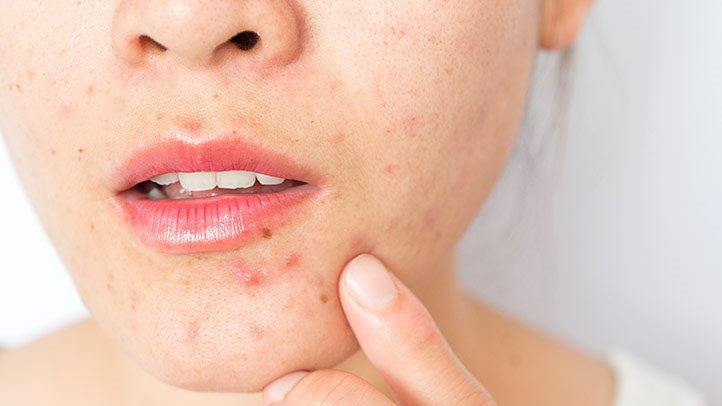List of foods that cause acne
Acne is a common skin condition that affects millions of people worldwide. While it is often associated with puberty and hormonal changes, diet plays a significant role in the development and exacerbation of acne. Research has shown that certain foods can trigger or worsen acne, while others can help improve skin health. In this article, we will explore a comprehensive list of foods that are known to cause acne and delve into the reasons behind their effects on the skin.

1. Dairy Products
Dairy products, including milk, cheese, and yogurt, have long been associated with acne outbreaks. Several studies have suggested a link between the consumption of dairy and the prevalence of acne, especially in adolescents. The hormones present in milk, such as insulin-like growth factor-1 (IGF-1) and androgens, are believed to stimulate the production of sebum, the oily substance that clogs pores and leads to acne.
Additionally, dairy products can cause inflammation in the body, further aggravating acne. For those prone to acne, reducing or eliminating dairy from the diet might lead to significant improvements in skin clarity.
2. Sugary Foods and Beverages
High-sugar foods and drinks, including candies, sodas, and desserts, can cause spikes in blood sugar levels, leading to increased insulin production. Elevated insulin levels can stimulate the production of IGF-1, which, as mentioned earlier, promotes sebum production and acne formation.
Moreover, sugar can increase inflammation in the body, making acne lesions more pronounced and harder to heal. Cutting back on sugary foods and opting for natural sweeteners or fruits can help manage acne symptoms effectively.
3. Refined Carbohydrates
Refined carbohydrates, such as white bread, pasta, and pastries, have a high glycemic index, meaning they quickly raise blood sugar levels. Like sugary foods, refined carbs lead to an increase in insulin and IGF-1 levels, contributing to the development of acne.
Switching to whole grains, such as brown rice, quinoa, and whole wheat products, can help maintain stable blood sugar levels and reduce the risk of acne outbreaks.
4. Fast Food and Fried Foods
Fast food and fried foods are often high in unhealthy fats, refined carbohydrates, and sodium, all of which can contribute to acne. The excessive consumption of these foods can lead to weight gain and insulin resistance, both of which are linked to acne.
Furthermore, the oils used in frying foods can increase inflammation and exacerbate acne symptoms. Opting for grilled, baked, or steamed dishes and incorporating more vegetables and lean proteins into the diet can help improve skin health.
5. Chocolate
Chocolate, particularly milk chocolate, has been associated with acne for many years. While the exact cause is not fully understood, it is believed that the combination of sugar, dairy, and high-fat content in chocolate contributes to its acne-inducing properties.
Dark chocolate, which contains less sugar and dairy, might be a better alternative for those who crave chocolate but want to avoid acne flare-ups.
6. Whey Protein
Whey protein, commonly used in protein shakes and supplements, can lead to acne outbreaks in some individuals. Whey protein contains IGF-1 and can increase insulin levels, both of which contribute to sebum production and acne.
Switching to plant-based protein sources, such as pea protein or hemp protein, can help those who experience acne from whey protein maintain their fitness goals without compromising their skin health.
7. Spicy Foods
Spicy foods, such as hot peppers and dishes seasoned with chili, can cause acne flare-ups in some people. Spicy foods can increase body temperature and blood circulation, leading to increased sebum production. Additionally, spicy foods can cause sweating, which can clog pores and result in acne.
If spicy foods are a trigger for your acne, reducing their consumption or choosing milder spices might help improve your skin condition.
8. Foods High in Omega-6 Fatty Acids
While omega-6 fatty acids are essential for health, an imbalance between omega-6 and omega-3 fatty acids can lead to inflammation and acne. Foods high in omega-6 fatty acids include vegetable oils (such as corn, soybean, and sunflower oil), processed foods, and certain nuts.
Balancing omega-6 intake with omega-3 fatty acids, found in fatty fish, flaxseeds, and walnuts, can help reduce inflammation and improve acne symptoms.
9. Alcohol
Alcohol, particularly when consumed in excess, can dehydrate the skin and disrupt the balance of hormones, leading to acne. Alcohol can also increase inflammation in the body, making it harder for acne lesions to heal.
Limiting alcohol consumption and staying hydrated with water or non-caffeinated beverages can help maintain clear skin.
10. Processed Foods
Processed foods, including snacks, ready-to-eat meals, and packaged desserts, often contain high levels of refined carbohydrates, sugars, and unhealthy fats. These ingredients can spike blood sugar levels, increase insulin production, and promote inflammation, all of which contribute to acne.
Choosing whole, unprocessed foods and preparing meals at home can help control the quality of ingredients and reduce the risk of acne.
Managing Acne Through Diet
While the foods listed above can contribute to acne, it is essential to recognize that individual responses to foods can vary. What triggers acne in one person might not have the same effect on another. Therefore, it is crucial to observe and identify personal dietary triggers through a process of trial and error.
Here are some general tips for managing acne through diet:
- Keep a Food Diary: Recording what you eat and noting any changes in your skin condition can help identify specific foods that trigger acne.
- Stay Hydrated: Drinking plenty of water helps keep the skin hydrated and can flush out toxins that may contribute to acne.
- Maintain a Balanced Diet: A diet rich in fruits, vegetables, lean proteins, and whole grains can provide the necessary nutrients for healthy skin.
- Consider Anti-Inflammatory Foods: Foods such as leafy greens, berries, fatty fish, and nuts have anti-inflammatory properties that can help reduce acne.
- Consult a Dermatologist or Nutritionist: If dietary changes do not improve your acne, seeking professional advice can help identify other potential causes and effective treatments.
Conclusion
Diet plays a significant role in the development and management of acne. By understanding and avoiding foods that cause acne, individuals can take proactive steps towards achieving clearer, healthier skin. While it may require some adjustments and experimentation, the benefits of maintaining a diet that supports skin health are well worth the effort. Remember, clear skin starts from within, and making mindful food choices is a crucial part of the journey to radiant, acne-free skin.


